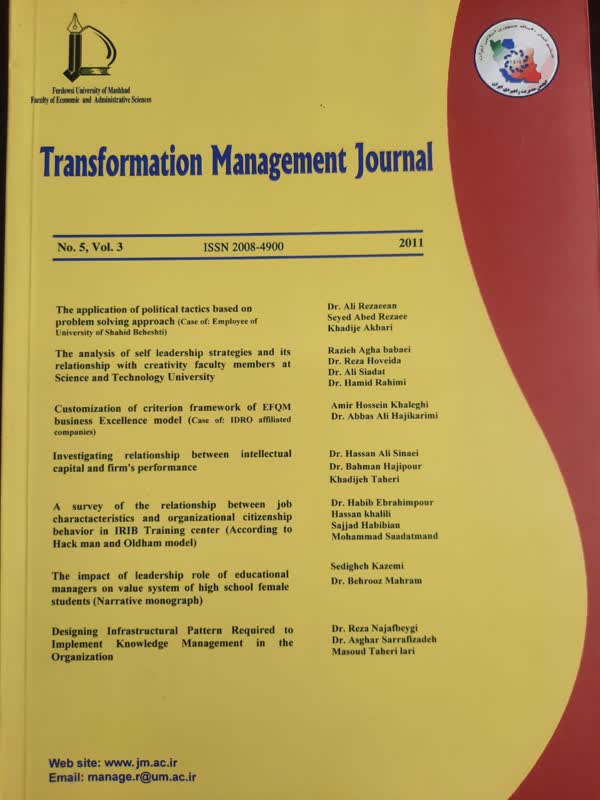Document Type : Articles
Author
Abstract
Existance of professional employes in organisations is vital for survival and business success in uncertain environment. Such employes work beyond their official resposibility and help organisations to achieve their goals. The different factors impact on creation of this behaviour. This article studies these factors acording to Hackman and Oldham model emphasizing on Organizational Citizenship Behavior instead of individual and organizational result. The population of this descriptive- survey research comprised of 250 from which data was collected using questionnaires. Data analysis was conducted by frequency distribution, percentage, Spearman correlation test. According to the research findings, there are positive and signification relationship between Motivating Potential Score (MPS) and Organizational Citizenship Behavior(R= 0/460), Critical Psychological State and Organizational Citizenship Behavior(R= 0/647) and between Job Charactacteristics with two dimensions of Motivating Potential Score and Critical Psychological State and Organizational Citizenship Behavior(R= 0/553). Finally, the article has presented suggestions and recommendations for improvement of Citizenship Behavior in Training Center and IRIBU.
Keywords
561-583.
- Bolino, M. & Turnley, W. (2003). Going the extra mile: cultivating and managing employee citizenship behavior, Academy of management executive, 17(3), 60 –71.
- Borman, W.C. & Motowidlo, S.J. (1993). Expanding the criterion domain to include elements of contextual performance, In N. Schmitt, W.C Borman, and Associates, Personnel Selection in Organizations, (Eds). San Francisco, CA:
Jossey-Bass
- Brayfield, A. H., & Crockett, W. H. (1995). Employee attitudes and employee performance, Psychological Bulletin, 52, 396–424.
- Castro, A., & Ruiz. (2004). The Influence of employee organizational citizenship behavior customer loyalty, International Journal of Service Industry Management, 15(1), 27-53.
- DiPaola, M,. Tarter, C., & Hoy, W. K. (2005). Measuring organizational citizenship in schools: The OCB scale, in wayne K. Hoy & cecil miskel (Eds.) Leadership and reform in american public schools. greenwich, CT: Information
Age.
- Garg, P., & Rastogi, R. (2006). Climate profile and OCBs of teachers in public and private schools of India, International Journal of Educational Management, 20(7), 529-541.
- Hackman, J.R. & Oldham, G.R. (1975). Development of the job diagnostic survey, Journal of Applied Psychology, 60, 159-170.
- Hafeznia, M. R. (2008). An introduction to the research method in humanities, Tehran: SAMT publication. (in persian).
- Hodson, R. (2002). Management citizenship behaviour and its consequence, Work and occupations, 29(1), 64-96.
- Iaffaldano, M. T., & Muchinsky, P. M. (1985). Job satisfaction and job performance: A meta-analysis, Psychological bulletin, 97, 251–273.
- Jamshidi, T. (1997). Increasing internal motivation and employes satisfacion according to Hackman and Oldham model, http://research.ui.ac.ir/. (in persian).
- Keshtidar, M. (2002). A Study of the relationship between source of control and stress and compare between faculty managers and sporting groups and Non-Sporting group, Ph.d. dissertation, Tehran University, Tehran, Iran. (in pesian)
- Koopman, R. (2001). The relationship perceived organizational justice and organizational citizenship behaviours: a review literature, Applied Psychology, ms advised by Dr, Richard tafall.
- Mahdad, A. (2005). Industrial and organisational psychology, (Thirth Ed). Tehran: Jangal Publication. (in persian).
- Markoczylivia & xin Katherine. (2004). The virtues of omission in organizational citizenship behaviour, university of californial.
- Moeller, N. L. & Fitzgerald, M. P. (1985). A Meta- Analysis of the relation of job characteristics to job satisfaction, Journal of Applied Psychology, 70(2), 280-289.
- Moorhead & Griffin. (2002). Organisational behavior, Seyed Mehdy Alvani and Gholamreza Memarzade, (Seventh Ed). Tehran: Mervarid Publication. (in persian)
- Moorman R. H. & Blakely G. L. (1995). Individualism- collectivism as an individual difference predictor of organizational citizenship behavior, Journal of Organizational Behavior, 16, 127-142.
- Murphy, A. & king. (2002). Job satisfaction and organizational citizenship behaviour, Journal of Management Psychology, 17(4), 287 – 297.
- Organ, D. W. (1988). Organizational citizenship behavior: the good soldier syndrome, Lexington, MA: Lexington Books.
- Pierie, S. (2000). A study of the relationship between job charactacteristics and employes motivation in Zahedan University, M. A. dissertation, Azad University of Kerman. Kerman, Iran. (in persian)
- podsakoff, M. p.,& Bachrach. (2000). Organizational citizenship behaviours: a critical review or the theoretical and empirical literature and suggestions for future research, Journal of Management, 26(3), 513 – 563.
- Rad, Iraji. (1999). A survey of the relationship between job charactacteristics and employes satisfacion in agricultural Jehad ministry, M. A. dissertation, Allame Tabatabaie University. (in persian)
- Robbins, S. P. (2000). Organisational behavior, (Fifth Ed) Translators. Tehran: Ali Parsaiean and Seyed Mohammad Arabi, , Cultural researcher office, Iran. (in persian)
- Robert H. Moorman & Gerald L. Blakely. (1995). Individualism- collectivism as an individual difference predictor of organizational citizenship behavior. Journal of Organizatioal Behavior, 16, 127-142.
- Turnipseed, D. & Murkison, G. (1996). Organization citizenship behaviour: an examination of the influence of the workplace, Leadership and Organization Development Journal, 17(2), 42 – 47.

Send comment about this article